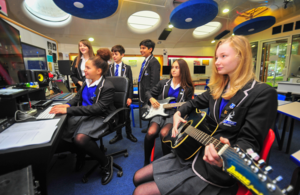Music is part of the curriculum but simply ‘doing’ music is not enough

@Ofstednews has published its latest music research review looking at music education in schools.
Today’s review is part of a series of research that examines different subjects across the curriculum. It draws on the evidence from the education inspection framework (EIF) and other literature to examine the contributions that can make a high-quality music curriculum, pedagogy, assessment, and the impact of school leaders’ decisions on music provision.
In England, all pupils should study music until the end of key stage 3. This expectation is reflected in the national curriculum and is at the heart of the EIF.
However, the number of pupils taking up music at key stages 4 and 5 continues to decline. Key stage 3 music provision has also been reduced and trainee primary teachers are offered shrinking amounts of musical training. And with reduced lesson time, this has been accompanied by lower levels of staffing to support a school’s rich musical life.
Therefore, it is more important than ever for schools to find ways that put high-quality music at the core of the curriculum.
Our review starts from the assumption that a central purpose of a good music education is that it enables pupils to perform the work of others, explore their own creativity through composing work and, through wider listening and engagement, come to a broader understanding of musical culture and meaning.
There are various ways that schools can construct and teach high-quality music curriculums. Our report identifies some common features that schools may want to consider in developing their music education, including:
- Curriculum content that might reasonably be mastered in the time available, remembering that sometimes less is more.
- Plentiful opportunities for pupils to return to and consolidate their short-term learning, with repetition of key curricular content and gradual introduction of new ideas, methods and concepts.
- Curricular scope that includes enabling pupils to develop technical control over the sound they are producing through the voice or instrument.
- Extensive listening opportunities to help develop pupils’ musical understanding.
- Space and time for pupils to explore the constructive components that build musical compositions and use these effectively to compose their own music.
- Opportunities to gain knowledge of how music over time and across cultures has been a conduit for human expression.
- High levels of guidance for beginners, remembering that pupils in every key stage are sometimes novices, with increasing freedom as pupils gain greater competence.
- Judicious use of summative assessment to identify pupil misconceptions or inaccuracies.
- Adequate curriculum time and regularity to allow musical learning to take place.
Her Majesty’s Chief Inspector, Amanda Spielman said:
Music touches the heart of our humanity and its sense of wonder has influenced human societies throughout history. For many pupils, the music they love will be part of the narrative of their lives.
Music is part of the curriculum but simply ‘doing’ music is not enough. We shouldn’t be satisfied with just having music on the timetable. We need to be ambitious about what we expect for music in the classroom and make sure that time is well used. So I hope the review provides helpful guidance for schools on designing and developing a high-quality music curriculum.
Ofsted plans to publish a report on the quality of the music curriculum taught in schools in 2022. We will gather the evidence for this through subject ‘deep dives’ during inspections under the EIF.











Responses